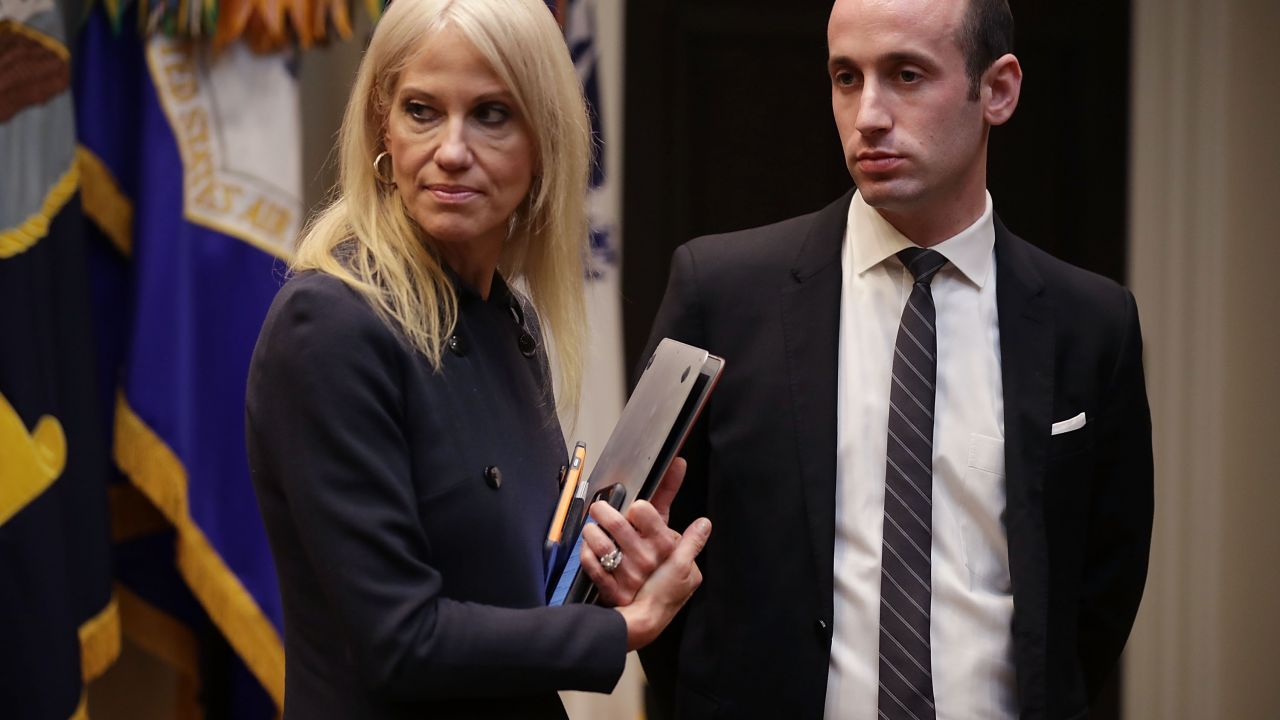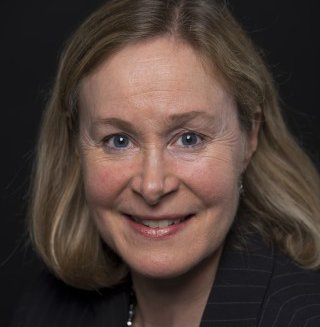
White House counselor to the president Kellyanne Conway and senior adviser for policy Stephen Miller wait for the arrival of President Trump for a meeting on cyber security in the Roosevelt Room at the White House on Jan. 31, 2017. (Photo by Chip Somodevilla/Getty Images)
This post originally appeared at The American Prospect.
So many ethics complaints have now been lodged against the Trump administration that it’s getting hard to keep track. The billionaires running Cabinet agencies, the White House advisers accused of self-dealing, and the president’s own failure to divest from his increasingly lucrative business holdings have all drawn so much notice that Americans may be tempted to tune out.
But the story of Trump administration ethics conflicts is not going away, and every new revelation sheds disturbing light on a White House culture that celebrates self-enrichment, and that treats the president’s inner circle as literally exempt from the rules that lay out a precise code of conduct for executive branch officials. The White House’s freewheeling attitude toward presidential advisers, in particular, poses special dangers and has rung alarm bells on Capitol Hill and in the federal Office of Government Ethics.
The latest complaint comes from Citizens for Responsibility and Ethics in Washington (CREW), a watchdog group that has asked White House Counsel Don McGahn to determine whether the Justice Department should investigate three meetings this year between White House official Christopher Liddell and as many as 18 companies in which he held stock. An assistant to Trump and his director of strategic initiatives, Liddell is a former senior executive with General Motors.
CREW says Liddell may have violated conflict-of-interest laws that bar federal employees from participating in matters in which they have a financial interest. Liddell appears to have held stock worth more than $2 million with the companies in question, which included GM, Dow Chemical, Ford Motor Company and Johnson & Johnson. A White House spokesman told CNN that Liddell “has been working with the Office of the White House Counsel to ensure he is fully compliant” with the rules.
It would be surprising, though, if the White House counsel — McGahn — took any action.
Under McGahn, the White House has canceled ethics training for White House staff and appointees and has failed to install an ethics czar as President Obama did, one of several ethics steps the previous president took in his bid to change the culture of Washington.
Moreover, the ethics executive order issued just eight days into the Trump administration is deeply problematic, says Public Citizen lobbyist Craig Holman. The order exempts federal rule-making from the lobbing ban, notes Holman in a recent op-ed, “one of the primary tasks of the executive branch.” It’s also not clear that the order will be implemented or enforced, he notes, or whether Cabinet officials have even been made aware of it.
A previous controversy involving Kellyanne Conway, the counselor to the president who urged viewers on Fox & Friends to “go buy” Ivanka Trump’s line of products, sheds light on the White House legal staff’s lackadaisical attitude toward ethics rules. In February, CREW alleged that Conway had violated laws that bar public officials from using their offices for their own private gain, or the gain of others. Walter M. Schaub Jr., director of the Office of Government Ethics, also wrote the White House recommending disciplinary action.
In response, Stefan C. Passantino, Trump’s deputy counsel for compliance and ethics, wrote Schaub that the White House Counsel’s office had concluded that Conway “acted inadvertently,” but had been advised that her comments “implicated the prohibition” on official endorsements. The letter also stated that although “many regulations promulgated by the Office of Government Ethics (‘OGE’) do not apply to employees of the Executive Office of the President,” such workers have been told that they are subject to standards of ethical conduct. Conway faced no sanction.
Schaub responded in a letter to Passantino: “I am more concerned about the extraordinary assertion that ‘many’ of OGE’s regulations are inapplicable to employees of the Executive Office of the President. The assertion is incorrect, and the letter cites no legal basis for it.” Schaub’s letter also stated: “It is critical to the public’s faith in the integrity of government that White House employees be held to the same standard of ethical accountability as other executive branch employees.”
Last week, Maryland’s Elijah E. Cummings, the ranking Democrat on the House Oversight and Government Reform Committee, followed up with a letter to McGahn to flag Passantino’s “troubling statement,” and to ask directly which specific OGE regulations he considers inapplicable to employees in the Executive Office of the President, among other questions.
Some ethics questions involving Trump advisers are, admittedly, not so clear cut. In December, Trump named billionaire investor Carl Icahn as his special adviser on regulatory reform. In February, reports surfaced that Icahn had helped the administration draft a possible executive order changing rules surrounding the Renewable Fuel Standard that requires oil refiners to blend a certain amount of ethanol into gasoline. Icahn has long opposed the standard, and the new rules are expected to shift the costs of implementing it away from oil refiners such as CVR Energy, a company in which Icahn owns a majority stake, and onto gasoline wholesalers, or “blenders.”
Public Citizen asked the Justice Department to investigate, citing a conflict of interest. But the White House calls Icahn a private citizen whose advice the president simply appreciates, not a federal employee subject to rules that bar federal employees from profiting from government service. The key question is whether Icahn was acting as a presidential adviser or in his own capacity. If the latter is the case, Public Citizen officials argue, then Icahn should register as a lobbyist under the Lobbying Disclosure Act. The public interest group has now asked the secretary of the Senate and the clerk of the House, which administer the LDA, to investigate.
“He wants to play it both ways,” says Holman. “He wants to be a private individual rather than a government employee. But as a private individual, he doesn’t want to register under the Lobbying Disclosure Act.”
Icahn has denounced what he calls a “witch hunt” by Public Citizen, to which the group’s president, Robert Weissman, responds: “We don’t think it’s a witch hunt to call for compliance with the Lobbying Disclosure Act.” The White House conflicts that continue to surface, says Weissman, reflect the tone set by Trump, whose failure to divest from his business interests sends an administration-wide signal that self-dealing is the order of the day: “It’s a president and a presidency that embodies the cronyism and corruption against which the candidate campaigned.”




